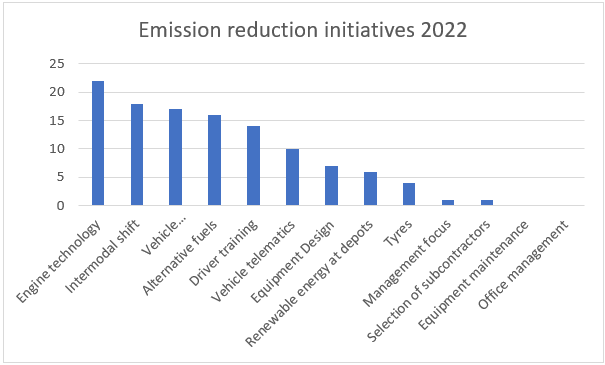Would you like to know what the leading chemical logistics companies are doing to reach the European goal of Net Zero (emission reduction)?
ECTA Responsible Care members are responsible for a combined vehicle fleet of over 11,500 vehicles (excluding any subcontractors). 87% of these have the latest Euro VI engines and 2% are already using alternative engine technologies/fuels (up from 1% the previous year). This includes Hydrogen and LNG trials in addition to switching to biofuels/HVO.
Logistics service providers in the chemical industry operate in a framework of sustainability aligned with the European Green Deal. The chemical producers hold their service providers responsible to report transport emissions and use the Safety & Quality Assessment for Sustainability System (SQAS) to do this. All of the ECTA Responsible Care members take part in this assessment system.
A key part of the sustainable agenda is the target of net zero carbon emissions and there is an accepted methodology for companies to report their carbon emissions which is built into the SQAS system. If you are interested to know what the leading logistics service providers are doing to reduce their emissions towards net zero, then read on.
emission reduction initivates 2022 by ecta rc members

The table above shows the emission reduction categories that are actively being pursued by the ECTA RC members over the last year.
The top categories include:
- Engine technology & alternative fuels
- Intermodal shift
- Vehicle management and route planning
- Driver training & use of vehicle telematics
Let’s look at each of these in a little more detail.
Engine technology
ECTA Members continue to invest in the latest combustion engine technology which is today still the Euro VI standard with those that are still running Euro V or below, looking to replace them. Some members are trialling hydrogen and LNG trucks whilst electric is replacing diesel for company cars and depot/site based vehicles.
Intermodal shift
There is a realisation that switching from road to rail where possible is an important leverage factor to reduce transport carbon emissions. Other modes such as barge and short sea are also being adopted and members are working in collaboration with their customers to identify opportunities to make the modal shift away from road. Remaining challenges are the flexibility and reliability compared to truck transport however the trend towards intermodal transport is set as a lower carbon transport solution.
Vehicle Management and route planning
This category includes a number of initiatives such as; increasing payload, reduced empty running, using cleaning stations closer to the point of discharge and fitting track & trace to tank containers to monitor and reduce the distances travelled. By far the most frequently mentioned initiative and the focus of many member companies is to reduce empty running. If unnecessary kilometres can be eliminated then so can the emissions that go with them!
Driver training and use of telematics
Eco-driving schemes have been around for a while and whilst still used by member companies, there is a development towards the use of vehicle telematics which monitor various aspects of the drivers behaviour such as ; harsh braking or acceleration, use of cruise control and engine idling. By analysing the telematics data and discussing the results with drivers, it can be a very effective coaching tool which delivers results. One of the more progressive ideas in this area is the use of a vehicle simulator and virtual reality technology to help with driver development.
Can we still win?
Hopefully, all of this demonstrates that our Responsible Care members are actively contributing towards the goal of net zero. If we can get that goal in extra time, we can still win.
Look out for our Responsible Care workshop in September where this topic will be one of several key themes up for discussion (Ticket Sale opening soon).

